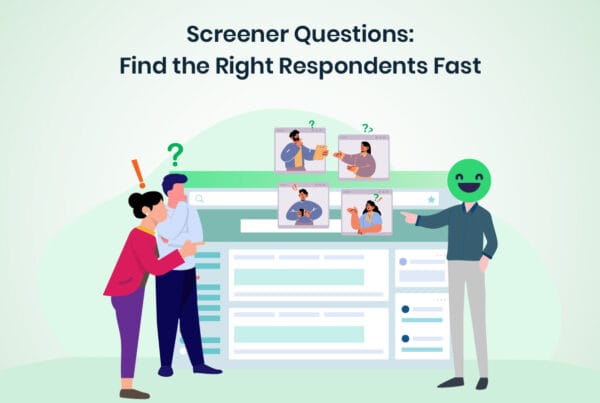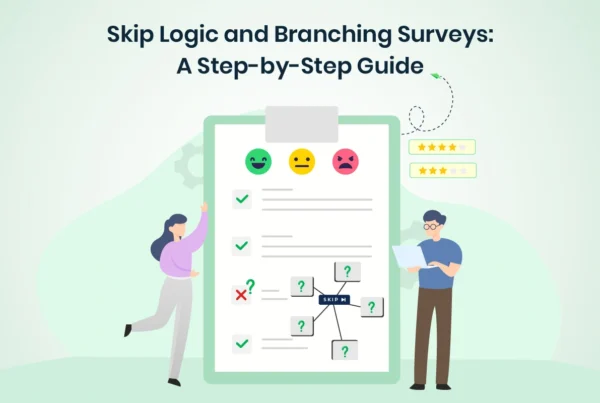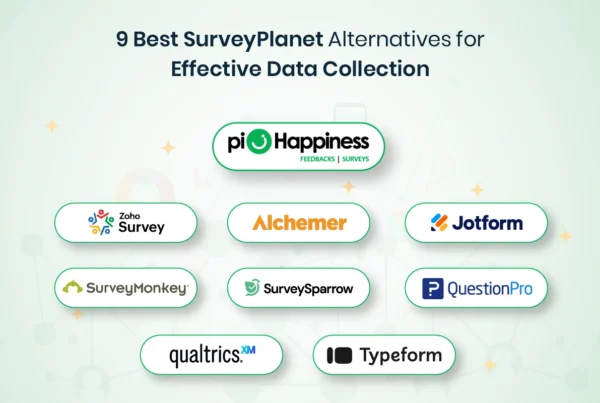Have you ever taken a survey and felt why some questions were easier to answer than others? Likert scale questions might be the secret. By simply asking people to rate their level of agreement, satisfaction, or awareness, Likert scales allow companies to get unbiased feedback without overwhelming the audience.
Unlock insights with Likert Scale questions! 🚀
Boost customer satisfaction today! 📈
As Likert scale questions provide a refined way to measure genuine opinions of the people, they have become fundamental tools in survey design. Let’s learn a little more about the various types of Likert scale questions with industry-specific examples.
Introduction to Likert Scale Questions
So, are you wondering what are Likert scale questions? Liker scale, also known as the rating scale, is a commonly used survey type to know the strong opinion of a person. These questions come with a variety of response options, generally 5 or 7 points. These choices usually range from:
- Highly satisfied to highly unsatisfied
- Extremely aware to extremely unaware
- Very likely to very unlikely
- Excellent to worst and more
Rensis Likert developed this method, thus the name “Likert scale questions” and this method is mainly used by companies in various industries, including customer service, research, and more. This helps them collect unbiased opinions or specific feedback.
Benefits of Likert Scale Questions:
- Ease of Use: These questions are clear, concise, and on-point, making it easy for respondents to understand and answer.
- Increased Response Rates: The straightforward format often leads to higher participation.
- Flexible and Affordable: They can be used across different subjects and are typically low-cost to administer.
- Measurable Data: Responses can be readily transformed into numerical values, facilitating statistical analysis.
- Specific Feedback: Provides clear, measurable feedback.
- Ease of Comparison: Makes it easy to compare responses across different groups or time periods.
8 Common Types of Likert Scale Questions
There are also different types of Likert scale questions. Here are a few:
- Level of importance questions determine how significant specific factors, features, or values are to the respondents.
- Satisfaction scale questions assess the level of satisfaction of the respondents regarding a product, service, or experience.
- Quality scale questions gauge the quality of a certain service, product, or experience.
- Likelihood to recommend questions shows how likely or unlikely people are to recommend a product or a service to others.
- As for agreement scale questions, they measure up to which extent people are willing to agree or disagree with the given statements.
- Effectiveness scale questions are asked to know the effectiveness of a product, a service, or an action.
- Questions that measure the frequency of a person doing a certain thing or experiencing a specific situation come under the frequency scale.
- In order to know the awareness level of people of specific features, products, or services, level of awareness questions are developed.
40 Likert Scale Questions with Examples
Satisfaction Likert Scale Questions
What do you think about our latest product update?
- Not satisfied at all
- Somewhat unsatisfied
- Neutral
- Somewhat satisfied
- Completely satisfied
How affordable is private education in India?
- Extremely affordable
- Very affordable
- Affordable
- Slightly unaffordable
- Extremely unaffordable
Can you rate your level of satisfaction with your recent purchase?
- Highly satisfied
- Satisfied
- Not at all satisfied
Did your child’s academic score meet your expectations?
- Surpassed my expectations
- Met my expectations
- Did not meet my expectations
Level of Importance Likert Scale Questions
How important is it to retain existing customers to your brand?
- Very important
- Low importance
- Slightly important
- Neutral
- Moderately important
- Not important
- Not at all important
As per your beliefs, is it important to follow old tale traditions blindly?
- Extremely important
- Somewhat important
- Neutral
- Not very important
- Not important at all
Please rate the level of importance of technology to you.
- Highly important
- Important
- Not important
Quality Likert Scale Questions
How would you rate the overall quality of the teaching materials provided?
- Very poor
- Poor
- Neutral
- Good
- Excellent
Kindly rate the quality of our hospitality services.
- Poor
- Fair
- Good
- Very good
- Excellent
What do you think about the quality of the food at street stalls?
- Extremely good
- Good
- Average
- Bad
- Extremely bad
How would you rate the security features of our new product?
- Good
- Fair
- Poor
Please rate the sturdiness of your newly bought sofa.
- Very poor
- Poor
- Neutral
- Good
- Excellent
Likelihood to Recommend Likert Scale Questions
How likely are you to recommend our healthcare services to others?
- Very unlikely
- Unlikely
- Neutral
- Likely
- Very likely
Will you suggest our properties to other potential buyers?
- Likely
- Neutral
- Unlikely
Considering our high placement percentage for years, how likely are you to recommend our educational institution to students?
- Very unlikely
- Unlikely
- Neutral
- Likely
- Very likely
Will you recommend India as one of the best places to travel to your foreign acquaintances?
- Definitely
- Very probably
- Probably
- Possibly
- Probably not
- Definitely not
Will you recommend cheap, mid-tier services over quality services?
- Likely
- Neutral
- Unlikely
Agreement Likert Scale Questions
I believe domestic trips are more enjoyable than international trips.
- Strongly disagree
- Somewhat disagree
- Neither agree nor disagree
- Somewhat agree
- Strongly agree
Please choose your response for the following statement: Paying guest accommodations are better than rented flats for students.
- Strongly agree
- Somewhat agree
- Neither agree nor disagree
- Somewhat disagree
- Strongly disagree
50% of company CEOs believe Gen Z is strict about work-life balance. Please let us know your opinion on this?
- Completely agree
- Moderately agree
- Neither agree nor disagree
- Moderately disagree
- Completely disagree
Our company resolves your queries within 24 hours.
- Agree
- Disagree
Grading system is the best. Do you agree?
- Agree
- Disagree
piHappiness has much better features than 90% of competitors.
- Strongly agree
- Somewhat agree
- Neither agree nor disagree
- Somewhat disagree
- Strongly disagree
Effectiveness Likert Scale Questions
How effective was our customer support in handling your travel-related inquiries or issues?
- Not effective at all
- Slightly effective
- Neutral
- Quite effective
- Extremely effective
Is our product effective in solving your problems?
- Effective
- Ineffective
Rate the level of effectiveness of the hybrid working model.
- Very effective
- Somewhat effective
- Effective
- Somewhat ineffective
- Very ineffective
Do you think teacher-parent meetings are effective for a child’s educational development?
- Definitely effective
- Probably effective
- Possibly effective
- Probably not effective
- Definitely not effective
In your opinion, are product demand surveys helpful for retail stores in terms of restocking?
- Very effective
- Moderately effective
- Not much effective
- Not at all effective
Frequency Likert Scale Questions
Do you often stay at hotels rather than airbnbs during vacations?
- Never
- Rarely
- Sometimes
- Frequently
- Always
How often should you drink water in about 2 hours?
- Very often
- Sometimes
- Rarely
In the last couple of years, how often have you fallen sick?
- Very frequently
- Frequently
- Occasionally
- Rarely
- Very rarely
- Never
In your opinion, how often do government employees come late to the office?
- Never
- Seldom
- About half the time
- Usually
- Always
How often do you go to the bank for transactions?
- Very often
- Often
- Sometimes
- Rarely
- Never
Do you often skip homework during weekends?
- Extremely often
- Often
- Never
Level of Awareness Likert Scale Questions
Are you aware of the latest SEO update?
- Not aware
- Somewhat aware
- Fully aware
Please rate your level of awareness in terms of technology.
- Not at all aware
- Slightly aware
- Somewhat aware
- Moderately aware
- Extremely aware
Are you aware of the recent increase in taxes on private employees?
- Yes, fully aware
- Somewhat aware
- No, fully unaware
Can you let us know your awareness level of the company’s leave policies?
- Not aware
- Somewhat aware
- Completely aware
Please indicate your level of awareness of the 2024 US elections.
- Fully aware
- Moderately aware
- Not aware at all
11 Tips to Write Effective Likert Scale Questions
To help you put together effective Likert scale questions, we have curated this section of practical tips.
- Keep questions clear and concise: Make sure to stick to clear, direct language. Keep the questions concise to ensure better clarity.
- Go for questions rather than statements: Asking questions will encourage people to respond genuinely as some people tend to agree with statements even if they contradict their thoughts.
- Pick the appropriate number of response choices: Depending on how detailed you want to know about people’s responses, you can add anywhere between 2 to 7 options.
- Consider adding skip logic: With skip logic feature, you can let people skip irrelevant questions, saving time for the respondents.
- Consider using flip scales: Some people tend to follow pattern bias, which is why it is best to change the direction of the responses rather than adding them in the same pattern.
- Avoid double negatives: Double negatives can be hard to comprehend, making it difficult for people to respond.
- No repetitive questions: Make sure to not write redundant questions and keep the questionnaire on point.
- Proofread and update: Before sending the surveys to people, always proofread and update the questions to ensure relevancy and that there are no errors.
Try Likert Scale Surveys for Business Growth
Likert scale survey is the solution to everything—from understanding customers’ satisfaction level to determining their awareness levels about specific things. By gathering genuine responses from the customers, businesses can enhance their offerings, leading to improved customer satisfaction.
piHappiness is here to help if you want to conduct a quick Likert scale survey. You can directly book a demo or try our free templates to know how piHappiness simplifies surveys and helps you gather feedback with ease.








